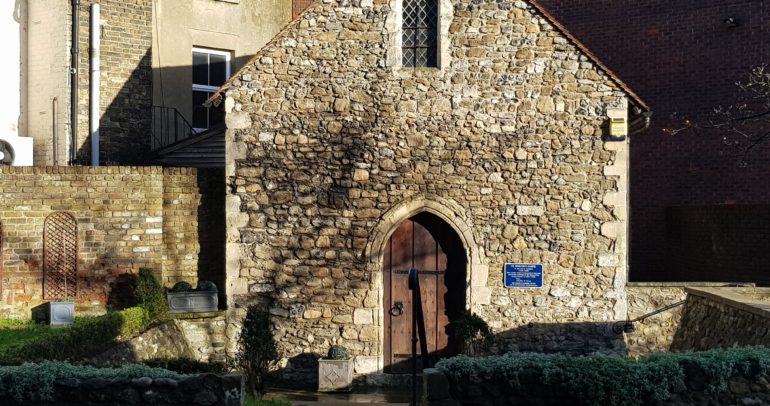Kaplica św. Edmunda na Priory Street to ocalały. Wbudowany 1252, Zamknięty jako kościół przez Henryka VIII, stał się warsztatem i przechowywanie 400 lat. Następnie, Prawie całkowicie zapomniane, że został zaplanowany na rozbiórkę poszerzania dróg po ostatniej wojnie. Heroiczne wysiłki miejscowych ludności uratowały św. Edmunda w ostatniej chwili, i został przywrócony i ponownie otwarty do kultu. Tylko w 28 stopy długie i 14 stopy, które może być najmniejszym kościołem w Anglii i jest popularnym przystankiem dla odwiedzających miasto. W 2020 Destination Dover, Partnerstwo turystyczne wspierane przez Radę Miasta, Projekt zarządzał pozyskiwaniem funduszy niezbędnych do poprawy budynku i otwarcia go częściej jako miejsce działań kulturalnych.
Lokalny kustosz Nicola Dunsbee rozpocznie wydarzenia w 2020 with her “Five Words Project”
“As a young curator, I was excited ….to put on a series of events to introduce St Edmund’s Chapel as a place to visit. I wanted the events to be closely linked to the amazing history and feel of the chapel, but I wanted to create a twenty-first century interpretation. I also wanted to keep the people of Dover in mind: arts events can often be alienating, so I wanted to make sure that the events were as accessible as possible for everyone in Dover. When I was researching the history of the chapel and its namesake, St Edmund, I found that he said: ‘five words well said are better than five thousand said without devotion’. So, Pomyślałem, że dobrze byłoby oprzeć moje wydarzenia wokół tego tematu „pięciu słów”. W rezultacie, Stworzyłem „The Five Words Project”.
Pierwsze wydarzenie wprowadzi program, i mam nadzieję, że przywiezię jak najwięcej Dovorian w przestrzeń, pokazując swoją pracę i dając im poczucie dumy i własności nad przestrzenią. Pierwsze wydarzenie nazywa się „MultiView”. Zbieramy domowe materiały z Dover i skompilujemy go, aby można je było rzutować na zewnątrz kaplicy. W kaplicy będziemy mieli również wystawę lokalnych zdjęć, które zostaną przesłane w formie pocztówki, aby historia lub pamięć można było napisać z tyłu zdjęcia.
The second event will be an opportunity for people to meet artists and listen to what they have to say. ‘Art Talk’ will begin with an artist’s residency in the chapel, during which time the public are welcome to pop in and speak to the artist or watch their process. Następnie, at the end of this residency, the evening event will happen. It will begin with talks from art practitioners around Dover – be it teachers, students, photography lovers or graffiti artists. We will then have a ‘speed-talking’ session, where people can talk to a number of artists. The artist who was in residence will then give a talk about what they have been doing in their residency.
‘Sonic-Optic’, the third event, will transform the chapel into an immersive sound and light experience. In churches and holy spaces, sound, such as the sound of the organ, the choir and the stony echoes, is fundamental to the experience. Light, such as that of stained glass or candlelight, is key too, so I thought it would be interesting to re-interpret these features in a twenty-first century way.
The fourth event is ‘Small Words’. St Edmund was an avid writer, and I wanted to think about how writing has changed in the 800 years between St Edmund’s time and our time. We are used to writing in 280 characters. I want to invite people to write 280 characters – an approachable and accessible amount – on the themes of Dover, the sacred or the chapel itself. This will be read out at the event, but also displayed in the chapel.
The concluding event will be ‘Five’. The most experimental and exciting event of them all, ‘Five’ allows artists and practitioners, such as dancers, actors, musicians and writers, to have five minutes of time at the event. They can use this time as they wish. Na przykład, someone could draw in the five minutes, or dance. The space of the chapel is fully opened up as somewhere for creativity to exist.
Altogether, these events work with the history of the chapel, interweaving it into modern life. I hope that these events give people a chance to experience creativity in a heritage site that they can feel is for them."
The Five Words Project will run from January to May 2020 na 4th Sunday of each month and more details of each event and how to get involved can be found on the Dover Arts Development website www.dadonline.eu and also on their Facebook page “The FIVE WORDS Project.
The Chapel is cared for by the St Edmund of Abingdon Trust and a full history and more information can be found on their website www.stedmundschapel.co.uk
